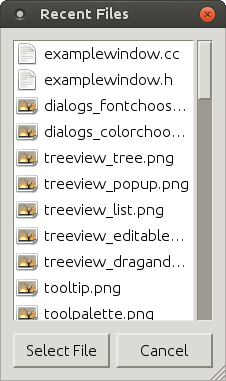| RecentChooser | ||
|---|---|---|
|
|
Chapter 21. Recently Used Documents | |
RecentChooser is an interface that can be
implemented by widgets displaying the list of recently used files.
gtkmm provides four built-in implementations for choosing recent files:
RecentChooserWidget,
RecentChooserDialog,
RecentChooserMenu, and the deprecated
RecentAction.
RecentChooserWidget is a simple widget for
displaying a list of recently used files.
RecentChooserWidget is the basic building block for
RecentChooserDialog, but you can embed it into your
user interface if you want to.
RecentChooserMenu allows you to list recently used
files as a menu.
Shown below is a simple example of how to use the
RecentChooserDialog class in a program.
This simple program has a menubar with a
menu item.
When you select this menu item, a dialog pops up showing the list of
recently used files.
| Note | |
|---|---|
If this is the first time you're using a program that uses the Recent Files framework, the dialog may be empty at first. Otherwise it should show the list of recently used documents registered by other applications. |
After selecting the menu item, you should see something similar to the following window.

File: examplewindow.h (For use with gtkmm 3, not gtkmm 2)
#ifndef GTKMM_EXAMPLEWINDOW_H
#define GTKMM_EXAMPLEWINDOW_H
#include <gtkmm.h>
class ExampleWindow : public Gtk::Window
{
public:
ExampleWindow(const Glib::RefPtr<Gtk::Application>& app);
virtual ~ExampleWindow();
protected:
//Signal handlers:
void on_menu_file_recent_files_item();
void on_menu_file_recent_files_dialog();
void on_menu_file_quit();
void on_menu_file_new();
//Child widgets:
Gtk::Box m_Box;
Glib::RefPtr<Gtk::Builder> m_refBuilder;
Glib::RefPtr<Gio::SimpleActionGroup> m_refActionGroup;
Glib::RefPtr<Gtk::RecentManager> m_refRecentManager;
};
#endif //GTKMM_EXAMPLEWINDOW_H
File: main.cc (For use with gtkmm 3, not gtkmm 2)
#include "examplewindow.h"
#include <gtkmm/application.h>
int main(int argc, char *argv[])
{
auto app = Gtk::Application::create(argc, argv, "org.gtkmm.example");
ExampleWindow window(app);
//Shows the window and returns when it is closed.
return app->run(window);
}
File: examplewindow.cc (For use with gtkmm 3, not gtkmm 2)
#include "examplewindow.h"
#include <iostream>
ExampleWindow::ExampleWindow(const Glib::RefPtr<Gtk::Application>& app)
: m_Box(Gtk::ORIENTATION_VERTICAL),
m_refRecentManager(Gtk::RecentManager::get_default())
{
set_title("recent files example");
set_default_size(200, 200);
//We can put a MenuBar at the top of the box and other stuff below it.
add(m_Box);
//Create actions for menus and toolbars:
m_refActionGroup = Gio::SimpleActionGroup::create();
//File menu:
m_refActionGroup->add_action("new",
sigc::mem_fun(*this, &ExampleWindow::on_menu_file_new));
//A menu item to open the recent-files dialog:
m_refActionGroup->add_action("recent-files-dialog",
sigc::mem_fun(*this, &ExampleWindow::on_menu_file_recent_files_dialog) );
m_refActionGroup->add_action("quit",
sigc::mem_fun(*this, &ExampleWindow::on_menu_file_quit) );
insert_action_group("example", m_refActionGroup);
m_refBuilder = Gtk::Builder::create();
// When the menubar is a child of a Gtk::Window, keyboard accelerators are not
// automatically fetched from the Gio::Menu.
// See the examples/book/menus/main_menu example for an alternative way of
// adding the menubar when using Gtk::ApplicationWindow.
app->set_accel_for_action("example.new", "<Primary>n");
app->set_accel_for_action("example.recent-files-dialog", "<Primary>o");
app->set_accel_for_action("example.quit", "<Primary>q");
//Layout the actions in a menubar and a toolbar:
const char* ui_info =
"<interface>"
" <menu id='menubar'>"
" <submenu>"
" <attribute name='label' translatable='yes'>_File</attribute>"
" <item>"
" <attribute name='label' translatable='yes'>_New</attribute>"
" <attribute name='action'>example.new</attribute>"
" <attribute name='accel'><Primary>n</attribute>"
" </item>"
" <item>"
" <attribute name='label' translatable='yes'>Recent Files _Dialog</attribute>"
" <attribute name='action'>example.recent-files-dialog</attribute>"
" <attribute name='accel'><Primary>o</attribute>"
" </item>"
" <item>"
" <attribute name='label' translatable='yes'>_Quit</attribute>"
" <attribute name='action'>example.quit</attribute>"
" <attribute name='accel'><Primary>q</attribute>"
" </item>"
" </submenu>"
" </menu>"
" <object class='GtkToolbar' id='toolbar'>"
" <property name='visible'>True</property>"
" <property name='can_focus'>False</property>"
" <child>"
" <object class='GtkToolButton' id='toolbutton_new'>"
" <property name='visible'>True</property>"
" <property name='can_focus'>False</property>"
" <property name='tooltip_text' translatable='yes'>New</property>"
" <property name='action_name'>example.new</property>"
" <property name='icon_name'>document-new</property>"
" </object>"
" <packing>"
" <property name='expand'>False</property>"
" <property name='homogeneous'>True</property>"
" </packing>"
" </child>"
" <child>"
" <object class='GtkToolButton' id='toolbutton_quit'>"
" <property name='visible'>True</property>"
" <property name='can_focus'>False</property>"
" <property name='tooltip_text' translatable='yes'>Quit</property>"
" <property name='action_name'>example.quit</property>"
" <property name='icon_name'>application-exit</property>"
" </object>"
" <packing>"
" <property name='expand'>False</property>"
" <property name='homogeneous'>True</property>"
" </packing>"
" </child>"
" </object>"
"</interface>";
try
{
m_refBuilder->add_from_string(ui_info);
}
catch(const Glib::Error& ex)
{
std::cerr << "building menubar and toolbar failed: " << ex.what();
}
//Get the menubar and toolbar widgets, and add them to a container widget:
auto object = m_refBuilder->get_object("menubar");
auto gmenu = Glib::RefPtr<Gio::Menu>::cast_dynamic(object);
if (gmenu)
{
//Menubar:
auto pMenubar = Gtk::make_managed<Gtk::MenuBar>(gmenu);
m_Box.pack_start(*pMenubar, Gtk::PACK_SHRINK);
}
else
g_warning("GMenu not found");
Gtk::Toolbar* pToolbar = nullptr;
m_refBuilder->get_widget("toolbar", pToolbar);
if (pToolbar)
//Toolbar:
m_Box.pack_start(*pToolbar, Gtk::PACK_SHRINK);
else
g_warning("GtkToolbar not found");
show_all_children();
}
ExampleWindow::~ExampleWindow()
{
}
void ExampleWindow::on_menu_file_new()
{
std::cout << " New File" << std::endl;
}
void ExampleWindow::on_menu_file_quit()
{
hide(); //Closes the main window to stop the app->run().
}
void ExampleWindow::on_menu_file_recent_files_dialog()
{
Gtk::RecentChooserDialog dialog(*this, "Recent Files", m_refRecentManager);
dialog.add_button("Select File", Gtk::RESPONSE_OK);
dialog.add_button("_Cancel", Gtk::RESPONSE_CANCEL);
const int response = dialog.run();
dialog.hide();
if(response == Gtk::RESPONSE_OK)
{
std::cout << "URI selected = " << dialog.get_current_uri() << std::endl;
}
}
The constructor for ExampleWindow creates the
menu and the toolbar using Builder (see Chapter 12, Menus and Toolbars for more information). It then adds
the menu and the toolbar to the window.
For any of the RecentChooser classes, if you
don't wish to display all of the items in the list of recent files, you
can filter the list to show only those that you want. You can filter
the list with the help of the RecentFilter class.
This class allows you to filter recent files by their name
(add_pattern()), their mime type
(add_mime_type()), the application that registered
them (add_application()), or by a custom filter
function (add_custom()). It also provides the
ability to filter based on how long ago the file was modified and which
groups it belongs to.
After you've created and set up the filter to match only the items you
want, you can apply a filter to a chooser widget with the
RecentChooser::add_filter() function.